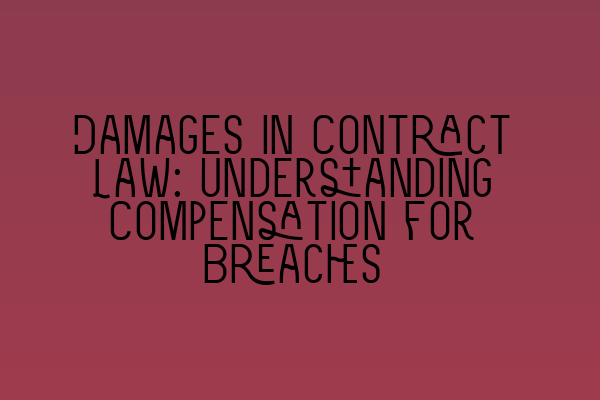Damages in Contract Law: Understanding Compensation for Breaches
In the world of contract law, breaches happen. It’s an unfortunate reality, but it’s one that every business and individual must be prepared to face. When a contract is broken, it can result in significant financial and non-financial consequences for the innocent party. That’s where the concept of damages comes into play.
Damages, in the context of contract law, refers to the monetary compensation awarded to the injured party as a result of a breach of contract. It’s a way to make the innocent party whole again and restore the position they would have been in had the breach not occurred. Understanding the ins and outs of damages can be complex, but it’s a crucial aspect of contract law that every solicitor and business owner should grasp.
There are different types of damages that can be awarded in a contract law case, depending on the circumstances. The first and most common type is compensatory damages. Compensatory damages aim to put the injured party in the same financial position they would have been in had the contract been fulfilled. This can include the recovery of any financial losses, such as lost profits or costs incurred due to the breach.
Another type of damages is consequential damages. Consequential damages go beyond the direct financial losses and compensate for the indirect losses that were reasonably foreseeable as a result of the breach. For example, if a contractor breaches a construction contract, the consequential damages may include the cost of hiring another contractor to complete the work or the loss of business income due to the delayed project.
Liquidated damages are yet another type of damages that can be specified in the contract itself. When parties anticipate that a breach might occur, they may include a provision that specifies a predetermined amount of damages that will be owed in the event of a breach. This can help simplify the damages calculation and provide a level of certainty for both parties.
In some cases, punitive damages may also be awarded. Unlike compensatory damages, which aim to compensate the injured party, punitive damages are intended to punish the breaching party for their wrongful conduct and deter others from engaging in similar behavior. However, it’s important to note that punitive damages are not commonly awarded in contract law cases unless it can be proven that the breaching party acted in a malicious or fraudulent manner.
It’s essential to remember that the goal of damages in contract law is not to punish the breaching party but to restore the injured party as much as possible. The innocent party has a duty to mitigate their damages by taking reasonable steps to minimize their losses. Failure to do so may result in a reduction of the damages awarded.
In conclusion, damages in contract law play a critical role in providing compensation for breaches of contract. Whether it’s compensatory damages, consequential damages, liquidated damages, or even punitive damages, the aim is to restore the injured party and make them whole again. Understanding the different types of damages and how they are calculated is crucial for both solicitors and business owners alike.
If you want to delve deeper into the world of contract law and enhance your understanding of the SQE exam, check out these related articles for valuable resources:
– SQE 1 Practice Exam Questions
– SQE 1 Practice Mocks FLK1 FLK2
– SQE 2 Preparation Courses
– SQE 1 Preparation Courses
– SRA SQE Exam Dates
These articles will provide you with valuable insights and resources to help you ace your SQE exams and prepare yourself for a successful career in contract law. Good luck!
